2024’s B2B Marketing Trend Insights: Stay Ahead of the Curve
Want to stay competitive in B2B marketing in 2024? This article dives straight into the latest B2B marketing trend you need to know. From AI-powered tools to video marketing and the rise of podcasts, find out how these trends can help your business stay ahead.
Key Takeaways
- AI-powered tools are revolutionizing B2B marketing by enabling data-driven decisions, scalable personalization, and predictive analytics, which are crucial for staying competitive.
- Video content, particularly short-form videos and webinars, is becoming integral in both outbound and inbound lead generation, significantly enhancing customer engagement and understanding of products.
- Podcasts and personalized email marketing are emerging as vital channels for building personal connections, establishing thought leadership, and fostering trust, with significant impacts on brand visibility and customer relationships.
Introduction
In a dynamic business landscape, understanding B2B marketing trends is paramount for any enterprise aiming to thrive. Some key trends to watch out for include:
- Technologies like AI are reshaping strategies with efficiency and effectiveness
- Marketers are grappling with challenges such as content creation and engagement
- The looming shadow of data privacy regulations
Keeping up with these trends will help businesses stay ahead in the competitive B2B marketing space. It will ensure they continue to meet the needs of their existing customers through their marketing efforts.
This article, grounded in extensive research by HubSpot’s Blog team, ventures into the heart of these developments. Let it serve as a compass to navigate the tumultuous seas of B2B marketing in 2024.
AI-Powered Marketing Tools
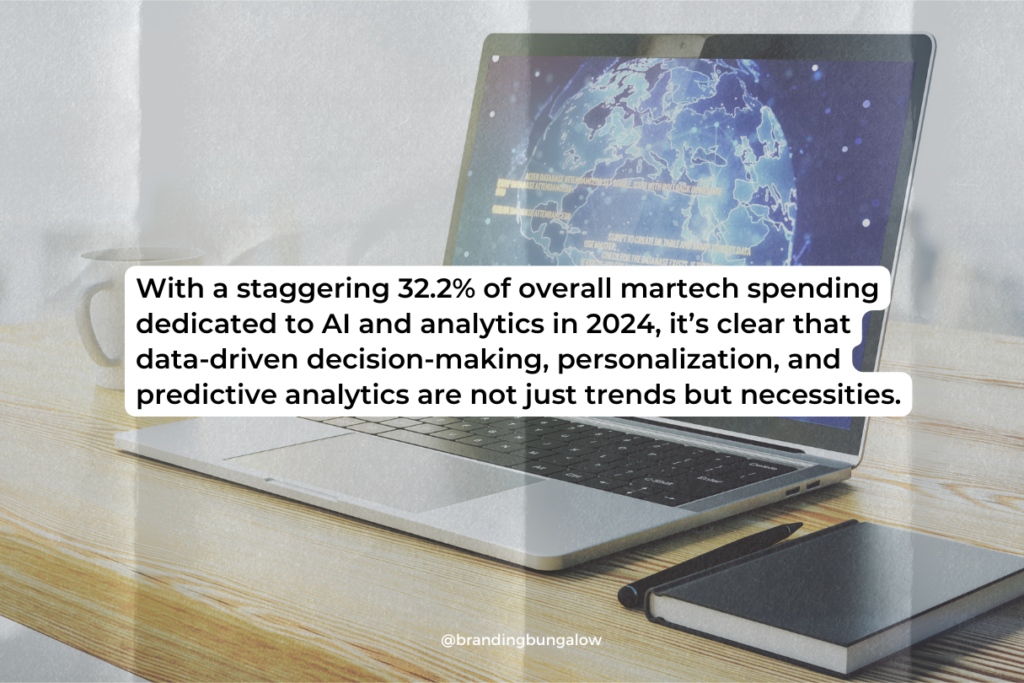
Revolutionizing every aspect of business, AI has become the cornerstone of modern B2B marketing strategies. With a staggering 32.2% of overall martech spending dedicated to AI and analytics in 2024, it’s clear that data-driven decision-making, personalization, and predictive analytics are not just trends but necessities.
We will discuss the role of AI as a vital partner in achieving marketing excellence.
Data-Driven Decisions with AI
Armed with AI, marketers at KodeKloud and beyond are turning data into gold. They use it to generate content, ads, and to fine-tune sales campaigns with unprecedented precision. However, while AI can sift through data and even engage with leads via chatbots, it’s a tool to be wielded with care to avoid pitfalls like inaccuracies and bias.
Using AI as a tool rather than the complete toolbox is crucial, as this approach enhances data-driven decisions and enriches human creativity and strategy.
Personalization at Scale
As the quest for customer engagement intensifies, personalization is the beacon guiding marketers to victory. AI’s power to tailor content to individual behavior and demographics is transforming the landscape of B2B marketing. With personalized content, businesses are not just reaching their audience; they’re resonating with them.
The shift toward personalization aims to build enduring relationships that enhance customer retention and satisfaction, rather than just gaining prominence.
Predictive Analytics for Proactive Strategies
Predictive analytics is the crystal ball of B2B marketing, giving businesses the foresight to anticipate customer needs and market trends. By leveraging AI’s predictive powers, companies can pivot from reactive to proactive. They are able to craft targeted marketing strategies that not only meet but exceed customer expectations.
Adopting these AI technologies has become a necessity for gaining a competitive edge in the digital landscape.
Leveraging Video Content for B2B Marketing
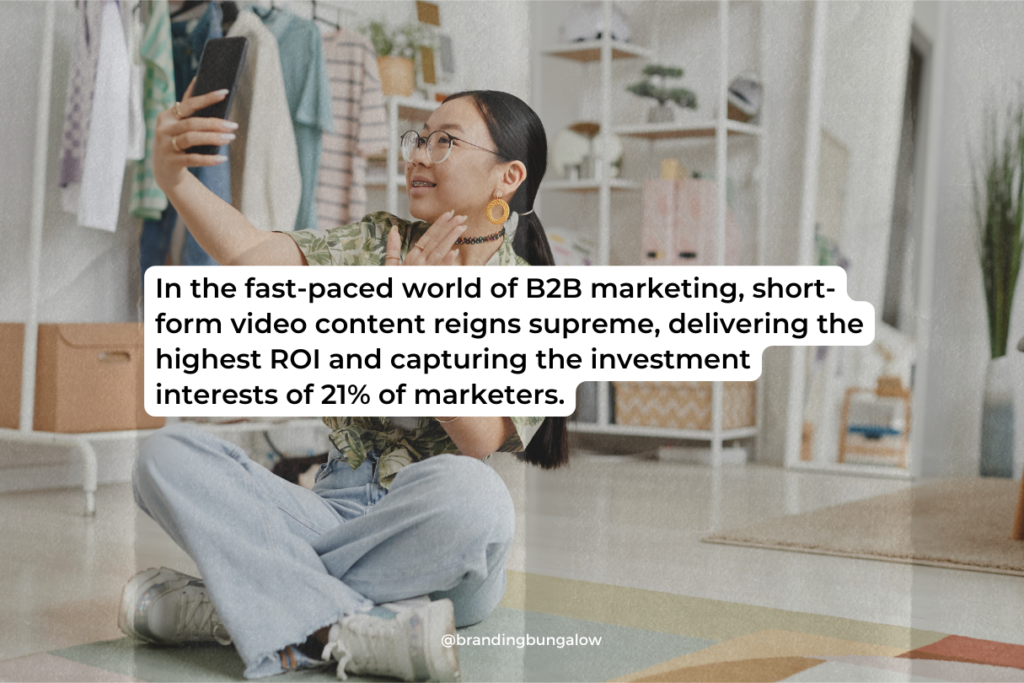
Video marketing is surging through the veins of B2B strategies. A staggering 96% of marketers attesting to its efficacy in helping prospects understand products and services. Whether through short-form bursts of creativity or in-depth product demos, video content is capturing the imagination and attention of business clients worldwide.
We will discuss how this visual medium is transforming lead generation and content marketing.
Short-Form Video Content
In the fast-paced world of B2B marketing, short-form video content reigns supreme. It delivers the highest ROI and capturing the investment interests of 21% of marketers. Platforms like TikTok are becoming unlikely heroes in this domain, with brands like Adobe leading the pack by producing engaging, bite-sized videos that showcase products in a way that’s both entertaining and unobtrusive.
Video in Outbound Lead Generation
Outbound marketing campaigns are no strangers to the allure of video content. It’s a medium that speaks directly to decision-makers, forging connections through personalized messages and product demos that traditional text content can’t match.
The tangible representation of products through video not only captivates the audience but also encourages action, establishing it as an essential tool for outbound lead generation.
Video in Inbound Lead Generation
The power of video in inbound marketing cannot be understated. It extends anywhere from enhancing SEO to serving as lead magnets in the form of webinars and tutorials. Repurposing content across platforms, tools like Wavve help businesses maximize the value of their video content, ensuring that it reaches and engages the widest possible audience.
The Rise of Podcasts as a Marketing Channel
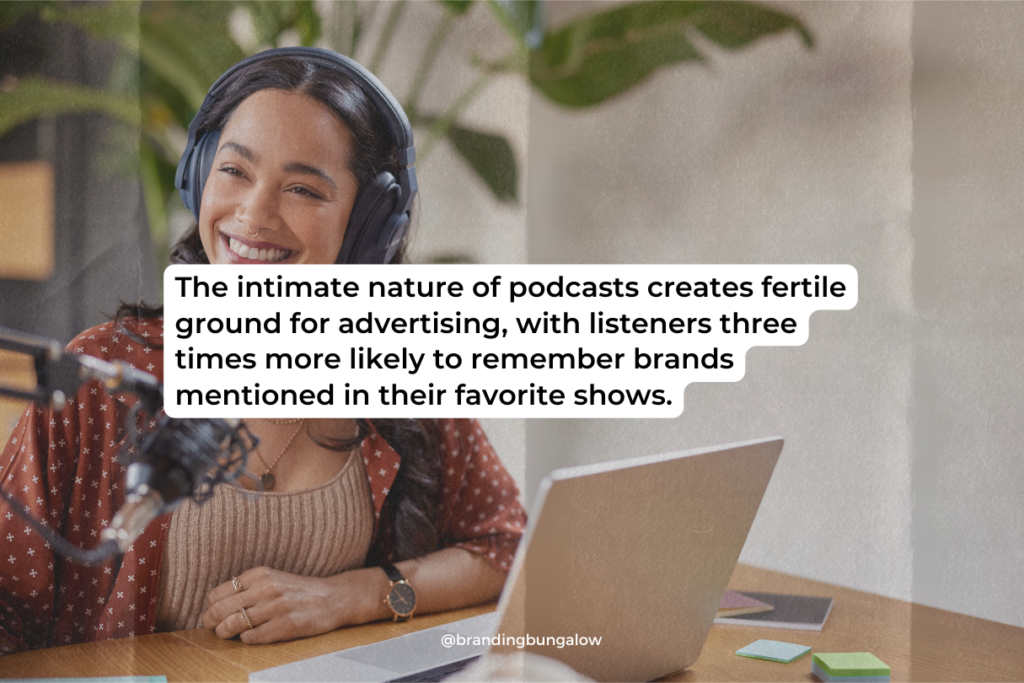
Podcasts are climbing the ranks as a compelling marketing channel. They capture the ears and minds of B2B audiences during moments when screens are out of sight but attention is undivided. With their ability to foster personal connections and offer niche expertise, podcasts are not just an emerging trend. They are becoming a staple in the B2B marketer’s toolkit.
Creating Branded Podcasts
Creating a branded podcast is like opening a direct line to your audience’s psyche, consistently delivering value, and building brand recognition in the process. From HubSpot’s industry insights to Drift’s CMO Conversations, these platforms are carving out space for companies to assert their thought leadership and cement their status as authorities in their field.
Advertising on Popular Podcasts
The intimate nature of podcasts creates fertile ground for advertising. Listeners are three times more likely to remember brands mentioned in their favorite shows. As 75% of B2B decision-makers tune into podcasts, the medium presents an untapped well of marketing potential that savvy businesses are starting to exploit.
Social Media’s Evolving Role in B2B Marketing
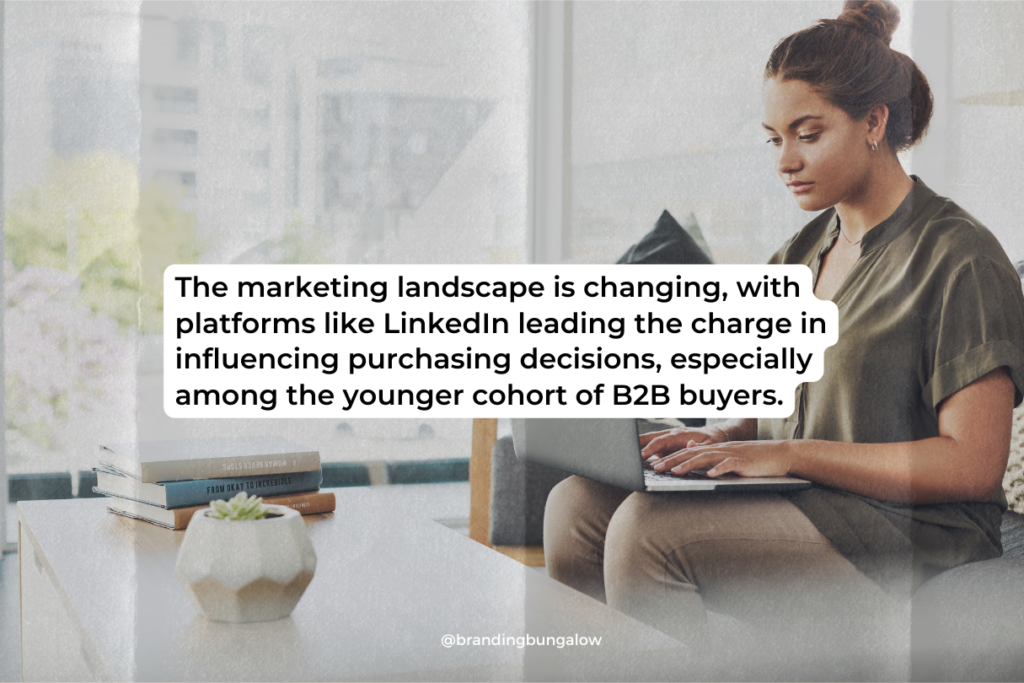
Social media channels, or social media platforms, are undergoing a metamorphosis in B2B marketing. They are transitioning from a mere presence to a potent tool for brand awareness and customer engagement. The landscape is changing, with platforms like LinkedIn leading the charge in influencing purchasing decisions, especially among the younger cohort of B2B buyers. As a result, social media marketing has become an essential component of modern B2B strategies.
We will look at how social media is altering the way businesses communicate with their professional audience.
LinkedIn’s Growing Influence
LinkedIn’s ascendancy in B2B marketing is undeniable. It provides a nexus for business professionals to connect and engage with content that resonates with their professional needs. With its targeted advertising and group features, LinkedIn is not just a social network. It’s a marketplace of ideas and opportunities.
Engaging Content Strategies
In the realm of social media, content is king, and the key to a successful content marketing strategy lies in the personal touch. Encouraging team members to share their valuable insights not only humanizes the brand but also amplifies its reach and resonance with a target audience hungry for authentic experiences.
Importance of Original Research and Data
Original research and data serve as the cornerstone of credibility in B2B marketing. Such proprietary information not only garners trust but also sets companies apart as thought leaders. It creates a halo of expertise that attracts customers, media, and even potential collaborators.
Establishing Thought Leadership
Amassing and sharing original research elevates a brand’s visibility and cements its reputation as an authority. It provides a platform for informed strategies that drive growth and innovation.
Enhancing Credibility and Trust
Original data is the bedrock upon which a company’s credibility is built, differentiating it in a crowded market and enabling informed decision-making that aligns closely with customer needs and market realities.
Personalized Email Marketing
Email marketing is evolving from a one-size-fits-all blast to a finely tuned instrument of personalization. B2B customers expect content that speaks directly to their unique needs and challenges. This shift aims to foster a relationship that goes beyond the inbox, rather than just improving metrics.
Crafting Personal Messages
Personalization in email marketing is about more than just a name in the header. It’s about crafting messages that resonate on a personal level, supported by CRM systems that provide a wealth of data for creating truly individualized communications.
Measuring Email Campaign Success
In the nuanced world of personalized email marketing, analytics tools are essential for tracking the success of campaigns. They provide insights into engagement, click-throughs, and conversions that inform and refine future strategies.
Influencer Marketing in B2B
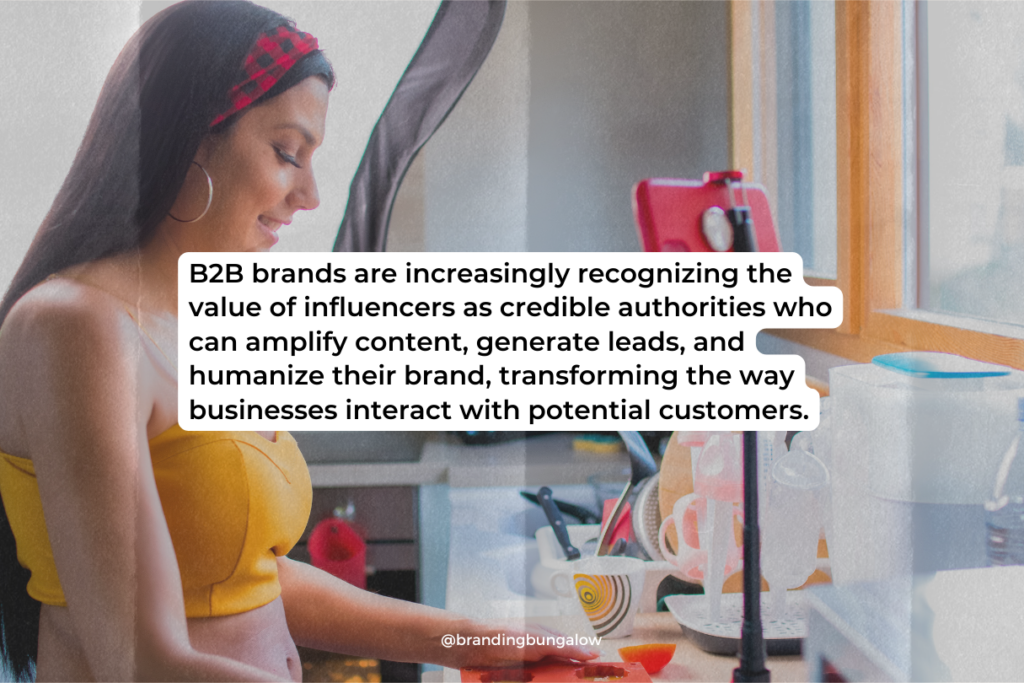
Influencer marketing is on a rapid ascent, with its projected spending expected to exceed $7 billion in 2024. B2B brands are increasingly recognizing the value of influencers as credible authorities who can amplify content, generate leads, and humanize their brand, transforming the way businesses interact with potential customers.
Identifying Relevant Influencers
Identifying the right influencers is a strategic exercise in aligning brand values with individuals who can authentically engage with the target audience. Successful influencers transcend single platforms, creating a seamless conversation across social networks that can elevate a brand’s presence and authority.
Measuring Influencer Impact
The impact of an influencer can be quantified not just in likes and shares, but in the authentic promotion of products and the guidance they provide to followers along the sales funnel.
Automation Tools for Marketing Efficiency
Automation tools are reshaping marketing efficiency, as 77% of CMOs leverage AI to automate tasks and streamline workflows. From managing PPC campaigns to creating semi-autonomous ad assets, the implementation of automation tools is setting a new standard for marketing efficacy.
Simplifying Marketing Workflows
Automation tools like Pardot and Active Campaign are simplifying marketing workflows. They allow B2B businesses to create complex, customized automations that enhance customer interactions and drive sales.
Enhancing Customer Relationship Management
Enhancing customer relationships is at the heart of B2B marketing. Tools like Sharp Spring are providing comprehensive solutions that manage every aspect of customer interaction, from email marketing to behavior tracking.
Utilizing Data Analytics for Marketing Insights
Data analytics serves as a guide for B2B organizations to traverse the expansive ocean of marketing strategies. By dissecting metrics and market trends, businesses gain the strategic insights necessary to understand customer preferences and allocate resources efficiently.
Tracking Key Performance Indicators
The heartbeat of a successful B2B marketing strategy can be measured by tracking key performance indicators. Data analytics provides a pulse check on campaigns. They ensure that strategies are data-driven and customer feedback is integrated into each decision.
Analyzing Customer Segments
Analyzing customer segments is a strategic exercise in personalization. By understanding the distinct characteristics and needs of each group, B2B marketers can tailor their campaigns to resonate more deeply with their target audience.
Trends in Digital Marketing Channels
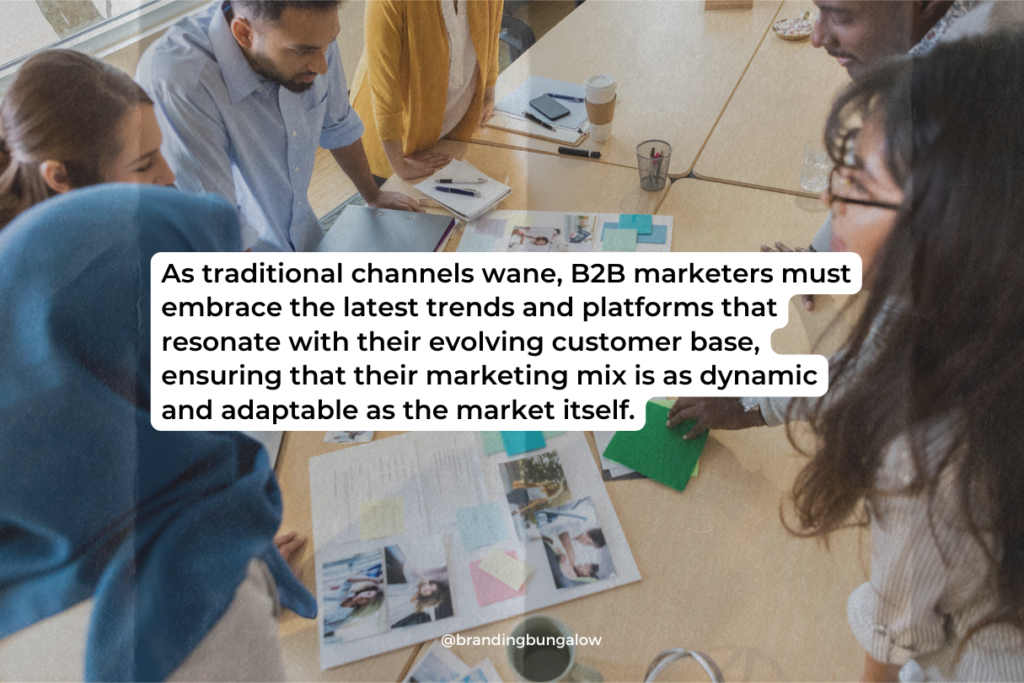
The digital marketing sphere is undergoing a significant transformation. Companies are reallocating 72% of their marketing budgets to digital channels due to the enduring impact of the pandemic. As traditional channels wane, B2B marketers must embrace the latest trends and platforms that resonate with their evolving customer base, ensuring that their marketing mix is as dynamic and adaptable as the market itself.
Voice Search Optimization
Voice search optimization is no longer a novelty but a necessity, as voice assistants become ubiquitous in professional settings. By optimizing for voice search, B2B marketers can expand their reach and deliver an enhanced user experience that caters to the needs of the busy professional.
Businesses must adopt natural language and mobile optimization to maintain their visibility and relevance in voice search results. Thus, they ensure effective search engine optimization.
Embracing New Advertising Platforms
As privacy concerns mount and the dependence on third-party cookies diminishes, B2B marketers are exploring new advertising platforms that prioritize user privacy. Innovations like TikTok’s AI-powered virtual assistant and Facebook’s Advantage+ are paving the way for more tailored and effective ad campaigns that resonate with potential customers without infringing on their privacy.
Summary
Traversing the vast and ever-changing terrain of B2B marketing trends in 2024 has revealed a landscape rich with innovation, personalization, and strategic foresight. From AI-driven marketing tools to the captivating power of video and podcasts, the key to success lies in understanding and leveraging these trends to create more meaningful connections with customers. As B2B marketers, we must continue to adapt, evolve, and embrace the tools and strategies that will define the future of our industry.
Frequently Asked Questions
How is AI transforming B2B marketing strategies in 2024?
AI is transforming B2B marketing by allowing for data-driven decisions, as well as personalized campaigns, and predictive analytics. It therefore results in more effective and tailored marketing strategies.
What role does video content play in B2B marketing?
Video content plays a crucial role in B2B marketing by enhancing engagement, conveying complex information effectively, and serving as a powerful tool for lead generation strategies. It is an essential component for businesses looking to reach and engage with their target audience effectively.
Why is original research and data important for B2B marketing?
Original research and data are important for B2B marketing because they establish a company as a thought leader, enhance credibility and trust, differentiate the brand from competitors, and provide valuable insights for strategic decision-making. This can significantly impact the success of marketing efforts.
How can B2B companies measure the success of personalized email marketing campaigns?
B2B companies can measure the success of personalized email marketing campaigns through analytics tools, tracking metrics like engagement, click-through, and conversion rates for refining personalization strategies.
What new trends are emerging in digital marketing channels for B2B?
In B2B digital marketing, new trends are emerging such as a shift towards digital self-service buying, voice search optimization, and privacy-friendly advertising platforms. These trends are shaping the future of digital marketing in the B2B sector.
Recent Blog Entries
Discounts to Dubsado CRM, Helcim Payment Processing and...
Brand audits can save your business' sinking marketing ship.
What's happening to Coke and what you can learn from it.
Shop Products
Create a personalize brand board by taking elements from our 3 signature brand board templates.